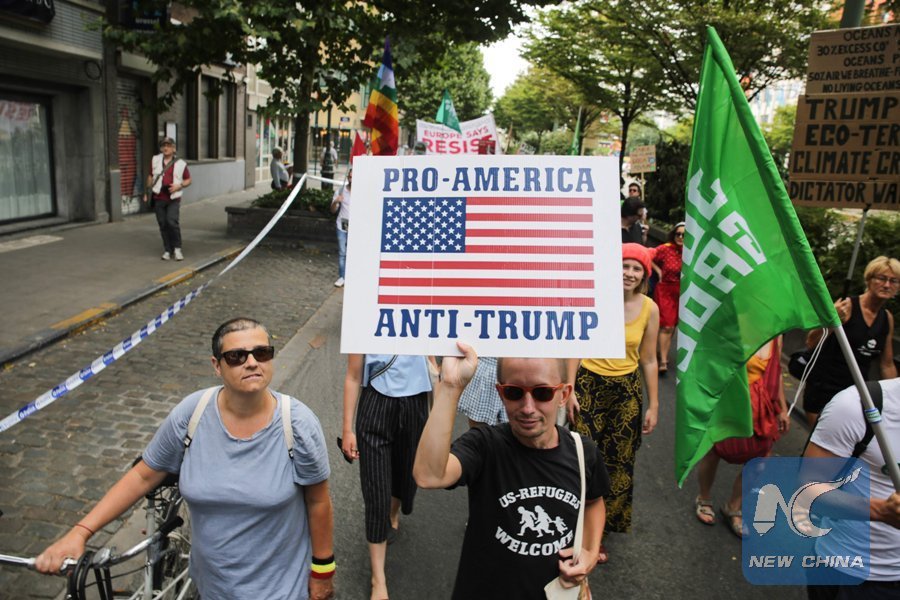
Protestors carry placards as they take part in a rally in Brussels on July 7, 2018, against the forthcoming NATO summit and scheduled visit of U.S. President Donald Trump on July 11 and 12. (Xinhua/AFP)
by Xinhua writers Liu Chen, Guo Yina
WASHINGTON, July 8 (Xinhua) -- The current U.S.-Europe relations are at a "difficult" time with a looming trade war and lingering political disputes, said a U.S. expert on the trans-Atlantic ties.
It's hard to predict their future right now, Frances Burwell, a distinguished fellow at the Atlantic Council, a U.S. think tank, told Xinhua in an interview ahead of the upcoming NATO summit in Brussels.
"A LOT MORE BARK THAN BITE"
The United States' relations with Europe, its traditional closest ally, have been bumpy since President Donald Trump took office in 2017, as Washington kept lashing out at Europe's "unfair trade practices" amid their disagreements on climate change and the Iran nuclear deal.
Trump, in his first year of presidency, has already started to complain about imports of German cars and almost anywhere where the United States has a "trade imbalance," said Burwell.
It was "a lot more bark than bite," the expert said.
But now, "the bite is becoming as loud as the bark," Burwell noted.
Recently, Trump has shaken up the world trading system by imposing tariffs on nearly all steel and aluminum imports for "national security reasons," including those from its European Union allies. Now Washington is considering doing the same for imports of automobiles.
Linking the trade disputes to a "national security threat" is something that is "very difficult" for the Europeans to understand, Burwell, who once served as director of the Program on Transatlantic Relations at the Washington D.C.-based think tank, told Xinhua.
The scholar warned that the disruption that the "bite" can cause should not be underestimated. She pointed out that the Europeans used to see Americans "as law-abiding, as trustworthy allies," a viewpoint she is not sure whether the Europeans are still holding.
"We are now at a place where over the next couple of years ... we will see whether that public sympathy for us continues," the expert said.
DIPLOMACY OR CAMPAIGN PROMISE
For Burwell, the upcoming July 11-12 NATO summit in Brussels, which will gather leaders of the 29-nation security bloc, can be a chance for Trump to mend ties with the European allies.
The defense spending is no doubt among the major topics for the summit. Trump has long been scolding those NATO countries which have not met the 2-percent-of-GDP benchmark.
"I think most of the countries can make a very good case of that by 2024," the expert said.
However, Burwell told Xinhua that what worried her most was the issues "that are not directly related to NATO," particularly "since the G7 (Group of Seven) summit ended as it did."
Amid criticism from Germany and France, Trump unexpectedly withdrew his support for a G7 communique inked at a Canadian summit in early June, after calling Canadian Prime Minister Justin Trudeau "very dishonest and weak."
"If there is a revisiting of that and then that could be a challenge for the NATO summit," Burwell commented.
For Burwell, Trump's understanding of U.S. foreign policy may not be of anything similar to his predecessors.
"We need to understand that a lot of the things that he (Trump) says are directed at his base of support," said Burwell.
"And they're not necessarily really based on familiarity with international issues as much as they are on reaffirming the messages that he sent during the campaign," the expert added.
Meanwhile, Burwell believed that Trump holds a personalistic view of international politics.
"Trump sees himself as a deal maker," believing that the personal touches could make the deal, the expert said.
However, when it comes to Europe, it is more like a system based on institutions rather than personalities.
Obviously, "the president is much more interested in personalities," said Burwell, hinting that it can somehow explain Trump's unease when dealing with Europe.
CONNECTIONS BUILT IN DECADES
Despite current disputes and name-calling rhetoric, Burwell still observes close cooperation on security across the Atlantic.
"In fact, we were seeing more U.S. engagement in military exercises, more deployment in Europe, and more funding behind the deployments," said the scholar.
After all, the trans-Atlantic connections "have been built up over many decades," she said.
Meanwhile, Burwell also admitted that Washington and its European allies are "at a difficult place," where, differing from those "bad places" they had before, the problems come "from the president himself."
Given Trump's unpredictable temperament, it is really difficult to say if there will be "moments of reconciliation" in the coming high-level encounters like the NATO summit, said Burwell.
"We just don't know at this point," she added.

